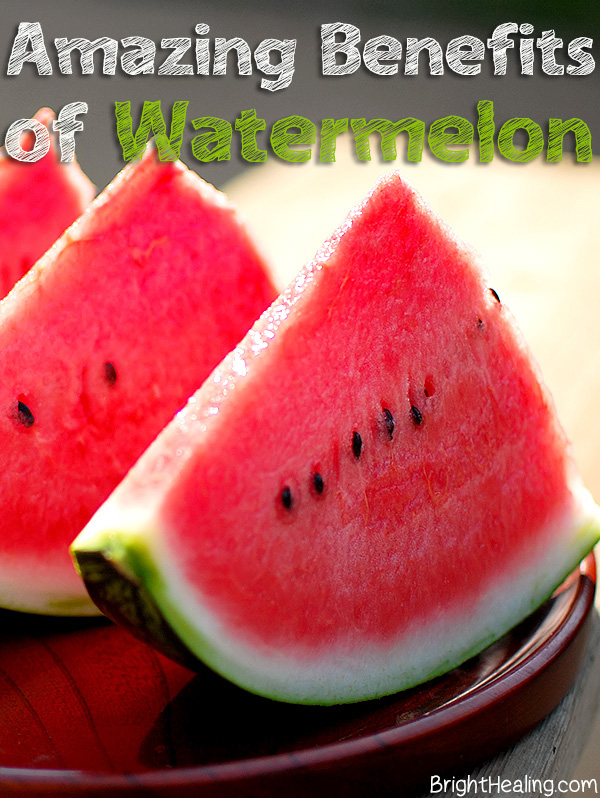Watermelon might be a summer fruit, but you tend to be able to find it all year round and you really ought to take advantage of its availability because, as it turns out, watermelon is incredibly good for you.
Watermelon is not only delicious but also very nutritious. Studies have shown that deep red varieties of watermelon have displaced the tomato as the lycopene king. Lycopene, however, is fat-soluble, meaning that it needs certain fats in the blood for better absorption by the body. Watermelon consists of 92% water and 8% sugar.
Botanically, the fruit belongs to the family of Cucurbitaceae, in the genus: citrullus, and is related to the other same family members such as cantaloupe, squash, and pumpkin that grow as vines on the ground surface. It is widely grown across many tropical countries where it is one of the major commercial fruit crops.
Its flesh are commonly bright red in color but there are also other varieties where its flesh are dark brown, orange, yellow, pink or even white.
Nutrition Benefits of Watermelon
Watermelon contains about 92 percent water, making it a good thirst quencher and diuretic. It also consists of about twelve percent fiber and is an excellent source of vitamin C and a very good source of vitamin A because of its beta carotene. High intakes of vitamin C and beta-carotene have been shown to reduce the risk of heart disease, improve asthma conditions, reduce the risk of colon cancer, and alleviate some of the symptoms of osteoarthritis and rheumatoid arthritis. Watermelon is also a very concentrated source of the carotenoid lycopene, which has antioxidant and cancer-preventing properties – 100 g of fresh melon provides 4532 µg lycopene, whereas this value only 2573 µg for tomatoes. Studies suggest that lycopene offer certain protection to skin from harmful UV rays.
Watermelon can boost energy: A daily serving of watermelon has been shown to boost energy levels by up to 23%. This is because watermelon contains vitamin B6, which the body uses to synthesize feel good dopamine. It also contains magnesium which assists in the body’s formation of adenosine triphosphate. Like a rechargeable battery, this nucleotide fuels cellular function for all-day energy.
Constipation: Drink a big glass of watermelon juice. It is very effective in aiding the elimination of wastes. Consuming plenty of this red juice will do a lot of good.
Cholesterol: Watermelon juice is healthful in preventing cholesterol from clogging arteries and can increase HDL, the good cholesterol, reducing the risks of cardiovascular diseases.

Hydration: Watermelons are the perfect example of a food that can help you stay hydrated. Their water content can help keep you hydrated, and their juice is full of good electrolytes. This can even help prevent heat stroke.
Muscle soreness: Watermelon-loving athletes are in luck: drinking watermelon juice before an intense workout helps reduce next-day muscle soreness and heart rate, according to a 2013 study published in the Journal of Agricultural and Food Chemistry. This can be attributed to watermelon’s amino acids citrulline and arginine, which help improve circulation.
Asthma: The powerful anti-oxidant in watermelon reduces toxic matters in the body, that in turn reduces asthma attacks.
Arthritis: The rich beta-carotene and vitamin C content in this big fruit do wonders in quenching inflammation that contributes to conditions like osteoarthritis or rheumatoid arthritis.
Watermelon has ingredient (arginine) that deliver Viagra-like effect. Arginine boosts nitric oxide, which relaxes blood vessels, the same basic effect that Viagra has, to treat erectile dysfunction and maybe even prevent it. Extra nitric oxide can also help treat angina, high blood pressure and other cardiovascular problems.
Consumption Tips
Watermelon is best eaten on its own, in fruit salads, or juiced. You may also freeze pureed watermelon in ice cube trays. Kids love this, especially on a hot day!
Whether you choose watermelons for their health benefits or simply for their good flavor, they can be an excellent snack, summer dish — or gardening project.
